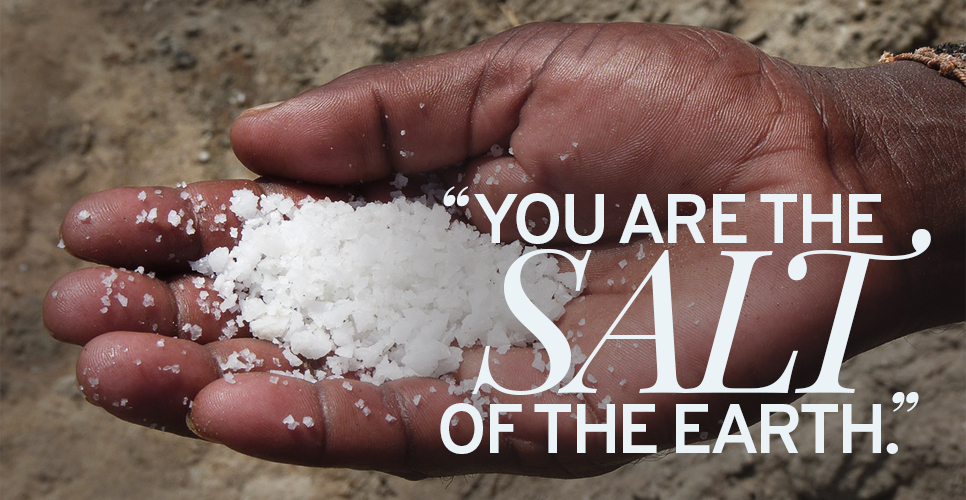What does it mean to be Salt of the Earth?
Reverend Edmund Chan, Leadership Mentor, Covenant Evangelical Free Church // January 23, 2018, 3:41 pm

Salt and light. These are two unforgettable metaphors.
Stunningly profound. Brilliantly provocative.
The Sermon of the Mount (Matthew 5-7) is Jesus’ manifesto of Kingdom discipleship. Everything else that Jesus taught in this grand manifesto is entirely anchored upon our understanding of these two metaphors. Jesus masterfully employed these two striking metaphors to convey something fundamental about radical discipleship.
These two discipleship metaphors are referring to two distinctly different things. The first emphasises what God calls us to be and the second, what God calls us to do.
The first metaphor, salt of the earth, has to do with discipleship with a sense of distinctiveness. It relates to one’s identity in the world.
The second metaphor, light of the world, has to do with discipleship with a sense of destiny. It relates to one’s influence of the world.
This is the first in a two-part series by Reverend Edmund Chan. Read the second article here.
Understanding “Salt of the Earth”
“You are the salt of the earth,” Jesus said. In our contemporary world, this metaphor seems rather uninspiring. The sentiment today is to eat less sugar, less fat and less salt.
So, who wants to be the MSG of the world? It doesn’t sound very flattering.
Why then didn’t Jesus simply say, “I’ve got news for you, you are the gold of the world”? That would be more inspiring than salt, wouldn’t it?
The answer is quite obvious. If He said “you are the gold of the world”, it would have referred metaphorically to being precious or worthy. But that’s not what Jesus had in mind. There is something else, something far more important, that He wanted to intentionally convey.
How then are we to understand this metaphor?
The common approach is to study the uses of salt; and thereafter to declare by inference its meaning for the Christian disciple.
Alison and Davies listed down 11 different ways that salt was used in ancient times and showed their implications what Jesus meant when He said that “you are the salt of the earth”.
Let me highlight for you just four common uses of salt and how these are prescribed to us as an understanding of the metaphor.
Four uses for salt
- Salt is used as a seasoning.
Thus as disciples we are to season the world; such as by “seasoning your speech with salt”. - Another use of salt in ancient times was as a healing antiseptic.
So, by inference, it means “as the antiseptic of the world, you bring about healing”. Indeed, the modern therapeutic revolution – of inner healing, physical healing, emotional healing – would certainly welcome this. - Salt was also used as a wage in ancient times.
That is why we have the modern saying “a man worth his salt”. It is taken from the days of the Roman Empire where they paid their Roman soldiers in salt as a wage. So, the inferred understanding is that the disciple is somewhat valuable. - The fourth use of salt was as a preservative.
In ancient times, meat was often preserved with salt to prevent it from turning bad. By inference, disciples are to be the preserving agents of the world. In a society that is spiritually corrupted and morally decaying, the Church as “salt of the earth” serves to preserve moral and spiritual purity.
This is a good and profitable consideration. But as to it being the interpretation of what Jesus really meant, I humbly beg to differ.
The context tells us something totally different. Jesus himself defined what He meant in the context. The Lord Jesus followed His metaphor with an important rhetorical question; it indicates to us what He was thinking about. He asked: “If the salt had become tasteless, how can it be salted again?” (Matthew 5:13)
Living with a sense of distinctiveness
Losing the saltiness of salt is quite difficult. Chemically, salt – sodium chloride – is a very stable compound. You keep it for years in a jar and it is still salty. So how can salt lose its saltiness? That’s the clue to our understanding of this metaphor.
Salt loses its saltiness by contamination.
In Jesus’ day, people in Palestine took their salt mainly from two sources. The rich could have their salt from the Mediterranean Sea area but others have their salt from the Dead Sea.
Salt taken from the Dead Sea can sometimes be contaminated by different minerals, especially gypsum, which looks like salt and can easily be mistaken for salt. It contaminates salt so that the salt not only loses its saltiness, it loses its usefulness as well. It’s contaminated. It’s good for nothing.
The warning that Jesus gives us here is a very significant one for the Church: Beware of being contaminated. A compromised Church is a contaminated Church.
Beware of being contaminated. A compromised Church is a contaminated Church.
Oswald Chambers said, “we need more Christians who are distinctively Christian; he is the one who points out to the Church of the very fact that it is so easy for us to become contaminated by the world”.
Don’t miss this. It is critically important. This then is the particular thing Jesus had in mind when He said “you are the salt of the earth”. The essential uniqueness of salt is what this metaphor is all about.
Not merely the usefulness of salt but primarily the uniqueness of salt.
It is so distinct that if you taste salt, there is nothing else to describe saltiness but salt. This is essentially tied with this idea of distinctiveness. He is talking about the distinctiveness of Christian disciples – of being so distinctively distinct – that there is nothing else like it!

Distinctively useful
Jesus is thus talking about the essential nature of the Church. If the church is not unique, it is useless (Matthew 5:13). It is good for nothing. The idea of usefulness is only seen in the context of distinctiveness.
Get this discipleship principle: The usefulness of the Church of Jesus Christ is directly linked to the distinctiveness of the Church of Jesus Christ. That’s discipleship of “a certain kind”. Another way of stating this principle is this: The Church has a distinct calling of God because it has a distinct character in God.
What Jesus was saying is that the Church is designed by God for God; but if it is not distinct in God, it is good for nothing else!
That’s what discipleship is all about. Character. So what Jesus was saying is that the Church is designed by God for God; but if it is not distinct in God, it is good for nothing else!
The Church is radical in calling because the Church is radical in nature.
We are to be disciples of “a certain kind”! This is expressed in the preceding context in Matthew 5, in the Beatitudes. Blessed are those who mourn, blessed are the gentle, blessed are the poor in spirit – these are the qualities that makes for the saltiness of the Church!
That’s why the “you” is an emphatic pronoun. It means “you and you alone” – there is nothing else! – “you are the salt of the earth”. There is no substitute for the Church. There is nothing like the Church. It is as unique as one of the most unique things on planet earth. Salt.
We are an independent, non-profit organisation that relies on the generosity of our readers, such as yourself, to continue serving the kingdom. Every dollar donated goes directly back into our editorial coverage.
Would you consider partnering with us in our kingdom work by supporting us financially, either as a one-off donation, or a recurring pledge?
Support Salt&Light



